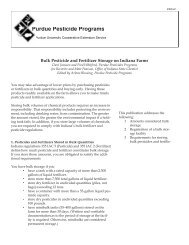Pesticides and Risk Communication PPP-52 - Purdue Pesticide ...
Pesticides and Risk Communication PPP-52 - Purdue Pesticide ...
Pesticides and Risk Communication PPP-52 - Purdue Pesticide ...
You also want an ePaper? Increase the reach of your titles
YUMPU automatically turns print PDFs into web optimized ePapers that Google loves.
Personal Preparation:<br />
Know What You Are Talking About<br />
Preparedness is the backbone of effective communication. Do your<br />
homework <strong>and</strong> know your subject—or don’t even bother!<br />
I Didn’t Study That in School<br />
Knowing more about pesticides than your audience knows does not<br />
make you “the expert.” <strong><strong>Pesticide</strong>s</strong> represent a complicated area of<br />
study, <strong>and</strong> even the most seasoned professionals in the field may not be<br />
experts; typically, their expertise is in only a small subpart of the issue.<br />
So know your stuff!<br />
He Says, She Says<br />
We often imply that scientists agree on the facts in their field, i.e.,<br />
that science speaks as one voice. But nothing could be further from the<br />
truth. In fact, it is common for reputable, well-known scientists to disagree!<br />
Do not be selective in assembling evidence to support your stance.<br />
An important aspect of risk communication is to underst<strong>and</strong> <strong>and</strong> appreciate<br />
the spectrum of scientific opinion on the subject, particularly when<br />
fronted by ingrained attitudes. Research shows that fixed attitudes can<br />
be modified only through balanced persuasion. If you do not present a<br />
reasoned discussion to an audience that has an adamant attitude<br />
counter to your message, that audience will react against your argument<br />
<strong>and</strong> intensify their belief to the contrary.<br />
I’ve Summarized the Research<br />
Be sure to read <strong>and</strong> review articles written for scientific journals by<br />
leading experts in the field. These works are essential reading because<br />
they merge published literature (past <strong>and</strong> present) <strong>and</strong> often project<br />
future needs. They also provide citations that will lead you to additional<br />
scientific literature on the issue. Authors do not always refer to the same<br />
literature base; so for a balanced perspective, read all you can find on<br />
the subject.<br />
That Research Sure Set the World on Fire<br />
Keeping up-to-date is vital. Be ever mindful of what is hot in the<br />
media. Read published articles <strong>and</strong> other scientific literature, <strong>and</strong><br />
research the issue on your own. Learn as many details as you can.<br />
Generally, people focus on the headlines, so go beyond that. Equip<br />
40




